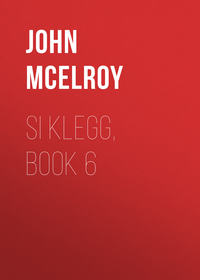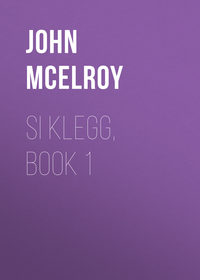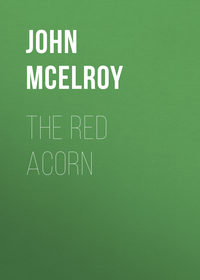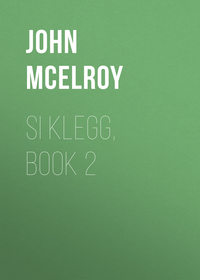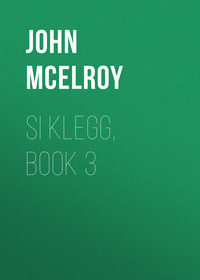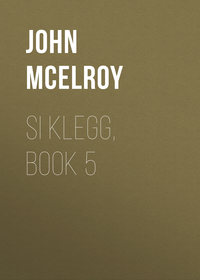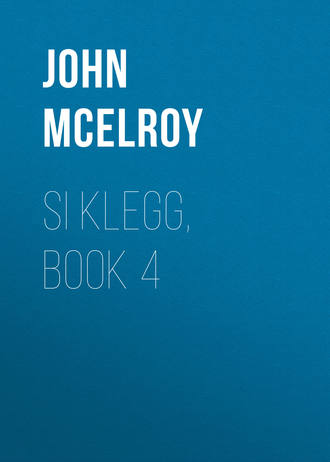 полная версия
полная версияSi Klegg, Book 4
The man who struck him was bayoneted by Abel Waite, who was dancing around the edges of the melee like a malignant little fiend, prodding wherever he could get a chance at a rebel body. The Irishmen, yelling like demons, were using their guns like shilelahs, and crushing heads in every direction, while Wat Burnham had thrown his musket aside, and was rushing at everybody with his mighty fists.
At length the rebels fled, leaving the Indianians in possession of their colors and the hillside.
"Some of you find Lieut. Bowersox, and bring him here," said Capt. McGillicuddy, sitting up, and beginning to twist a handkerchief around his thigh, to form a tourniquet. "Lieutenant, you all right?"
"Nothing more than a mere scratch on the side of my head," said the Lieutenant, wiping away the blood.
"Well, Lieutenant, you'll have to take command of the regiment. I had a personal altercation with that Mississippi Colonel lying over there, and he put a bullet through my thigh. Get the men together, pick up our wounded, and fall back to the top of the hill again."
"I'm afraid there's no use of picking up Corp'l Klegg and Shorty," said the Lieutenant, with tears in his eyes. "They got the rebel flag, but they're lying there stiff and cold."
"Well, bring them back, anyway, so we can lay them beside the other gallant boys who have fallen to-day."
CHAPTER XVII. IN THE HOSPITAL
REMOVED FROM THE BATTLEFIELD TO THE HOSPITAL AT CHATTANOOGAFOR a short time a silence that seemed oppressive followed the fierce turmoil of the last charge of the rebels upon Snodgrass Hill and its repulse. Both sides had exhausted themselves in the awful grapple, and had to regain breath and thought. Then the night was pierced by the agonizing groans of the innumerable wounded, the stern commands of officers to their men to re-form, the calls of scattered men seeking their regiments and companies.
The sadly-shrunken remnant of the unconquer able 200th Ind. gathered around its regimental colors, on the front of the crest of Snodgrass Hill, and grimly, silently prepared for the next event, whatever it might be. The wounds of those still able to fight were bound up, and they resumed their places in line. The worst hurt were helped or carried back to the busy Surgeon under the shelter of the hill. The newly-dead were brought up and added to the row of those who had already fought their last battle. Cartridge-boxes of both dead and wounded were carefully searched for remaining cartridges. Si and Shorty were laid at the end of the long row.
The chill air of the evening began to revive Si and Shorty. Si's brain responded long before any of his muscles. At first it seemed the vaguest and most shadowy of dreams. There was a dim consciousness of lying somewhere. Where it was, how he came there, what was going on around he had not the slightest idea nor desire to know. There was just the feeling of being there, without any sensation of comfort or discomfort, wish or longing.
One by one, and very slowly, other nerves awoke. He became conscious that there was a sharp stone or knot under his head, which hurt, and he tried to move it, but queerly his head would not move, and then he found that neither would his hands. This was faintly puzzling, as things are in dreams. Then his throat became on fire with thirst, and somehow there came a dream of the deliciously cool well on the farm at home, the bucket covered with green moss swinging over it, the splash of cool water when it was lowered, the trough by the side, where they used to pour water for the fowls to drink, the muddy spot around, where water plants grew on the splashings and drippings. Then were visions of the eternal, parching thirst of the damned, which he had often heard preachers describe, and he was conscious of a faint curiosity as to whether he had died and waked up in the home of the lost.
Still not a muscle waked up to obey his will, and he seemed indifferent whether it did or not. Then he forgot everything again, until presently his burning throat recalled his consciousness.
He felt the cold, bracing air in his nostrils, and slowly, very slowly at first, he began to hear and understand the sounds around him. The shriek of a wounded comrade carried past, whose leg had been shattered, first sounded like the hum of bees, and finally translated itself into something like its true meaning, but he had no comprehension or sympathy for its misery.
He tried to make some sound himself, but his tongue was as hypnotized as his other muscles, and refused to obey his will. Yet at the moment he did not seem to care much. His wishes were as numb as his tendons and sinews. He became shadowly conscious of his comrades gathering around him, picking him up, carrying him back up the hill, and laying him down again. This relieved the sharp pain from the stone under his head; but when they laid him down again his head fell too low. He heard the murmur of their voices, and felt their hands searching his pockets for cartridges.
Consciousness began returning more swiftly, though the muscles were yet paralyzed. He could feel to the tips of his fingers, yet he could not move them. He began to understand the words spoken about him, and comprehend their meaning. The first sentence that filtered its way to his brain was Lieut. Bowersox's order to the regiment:
"The orders are to fall back quietly. We'll follow the 1st Oshkosh, on our right. As soon as it is well down the hill we'll move by the right flank, and fall in behind it. Our wagon is right at the bottom of the hill. Those that are not able to march will start now, and get in it. It will move right after the regiment. Don't anybody say a word of this above his breath. The rebels are listening sharply for our movements. We dare not even cheer, for fear they'll find out how few are left of us. All of you keep a lookout, and follow right after me when I start, for I won't give any order."
Then all his consciousness seemed to wake up at once into an agony of fear of being left behind to fall into the hands of the rebels. He made a desperate effort to call out, but his tongue seemed dry and useless as a cornhusk in his parched mouth, and his throat too burning hot to perform its office. Nor could he lift a finger nor move a toe.
He found room for anger at Shorty that he did not look him up, and satisfy himself as to his condition, and Lieut. Bowersox and the rest seemed selfishly thoughtful of their own safety and neglectful of his.
He listened in agony to the regiment on the right marching off, to the cautions and admonitions given those who were carrying off the badly-wounded, and then to Lieut. Bowersox starting off with the right of the 200th Ind.
Then he heard little Abel Waite say:
"I know that Si Klegg has some things on him that his folks' d like to have. I know where they live. I'm goin' to git 'em, and send 'em to 'em."
"Make haste, then, young feller," he heard Wat Burnham growl. "Don't let the rebels ketch yer. We're movin' now."
He heard Abel Waite's steps running toward him, and felt his hands thrust into his blouse pocket over his breast. Then the boy said with a start of surprise:
"Why, he's alive yet. Come here, Wat."
Wat and the Irishmen hastened to him. He felt
Wat's hand laid on his breast, and then held over his mouth.
"'E's certainly warm yet. Hand 'e breathes."
Shorty made a violent effort, and summoned enough strength to reach over and touch the Englishman's foot.
"The tall feller's alive, too," said Wat.
"We must take 'em along with us," said Abel Waite excitedly.
"Yes, but 'ow?" growled the Englishman. "Don't speak so loud, you young brat. Do you want to hopen hup that 'ell's kitchen hagin?"
"The Liftinant's far down the hill wid the regiment," said Barney McGrath. "There's no toime to sind for him. Here, lit's pick thim up an' carry thim down to the wagon."
He put his hand under Si's shoulder. The others did the same, Wat lifting Shorty's feet.
"Halt, there, you Yanks, and surrender," said a stern voice just behind Wat.
Wat looked back over his shoulder and saw a single adventurous rebel who, divining what was going on, had slipped forward in the darkness, with his gun leveled on the squad bearing Si. Wat realized instantly that the rebel must be suppressed with out alarm to others that might be behind him. He dropped Shorty's foot, and with a backward sweep of his mighty right took the rebel in the stomach with such force as to double him up. The next instant Wat had his throat in his terrific grip, and tried to tear the windpipe from him. Then he flung the rebel forward down the hill, gathered up Shorty's feet again, and gave the command:
"Hall right. Go a'ead, boys, quick has you can."
With great difficulty they made their way over the wreckage of battle down the hill toward where they expected to find the regimental wagon. But it had received all that it could hold of its ghastly freight and moved off.
They were is despair for a few minutes, until Abel Waite discovered an abandoned wagon near by, with one mule still hitched to it. Next they found a wounded artillery horse which had been turned loose from his battery. He was hitched in, and Si and Shorty were laid on the layer of ammunition-boxes which still covered the bottom of the bed.
"Who'll drive the bloody team?" growled Wat. "Hi never druv a 'oss hin my life. 'Ere, Barney, you get hin the saddle."
"Not Oi," answered Barney. "Oi niver could droive ayven a pig, on the brightest day that shone. Oi'll not fool wid a couple av strange horses, a wagon-load av foire an' brimstone, an' a brace av dead men, in the midst av Aygytian darkness. Not Oi."
"Here, I kin drive two horses, anyway," said Abel Waite, climbing into the saddle. "I've done that much on the farm."
They pushed off into the road marked by the dark line of troops moving silently toward McFarland's Gap, and after some contest with other drivers secured a place behind one of the regiments of their brigade.
A couple of miles ahead Forrest's cavalry was making a noisy dispute of the army's retreat, the woods were on fire, and the fences on either side of the road were blazing.
The long line was halted in anxious expectation for a little while, as the storm of battle rose, and the men looked into each other's faces with sickening apprehension, for it seemed much like defeat and capture. Then loud cheers, taken up clear down the line', rose as Turchin's Brigade, by a swift bayonet charge, swept away all opposition, scattered the rebels to the shelter of the woods, and reopened the way. But the rebels still continued to fire long distance shots at the road as outlined by the burn ing fences.
Though one of his team was wounded, Abel Waite had little difficulty in keeping his place in column until the burning lane was reached. The regiment ahead had gone through on the double-quick, and teams as fast as they could be lashed.
"What'll we do now?" he called out to the others in his boyish treble. "I can't git these plugs out of a walk. If we go ahead the fire'll bust the ammunition, and send us all sky-huntin'. If we stop here them rebels 'll git us, sure."
"Go a'ead, Habe," growled Wat, after a moment's thought. "We can't 'elp you, but we'll stay wi' you. Hif she busts, she busts, hand that's hall there'll be hof hit hor hof us. We'll stick by the wagon, though, till she busts, hand then nobuddy but the crows 'll hever find hany hof hus. Go a'ead, you bloody brat."
"Cut me one o' them young hickories for a gad," said Abel, pointing to the brush by the side of the road, "and I'll git as good time out o' these poor brutes as they kin make, if I skin 'em alive."
Abel lashed his animals with all the strength of his young arm, and succeeded in keeping them in something like a trot. The men ran alongside, and fought the fire as well as they were able. Several times the wagon-cover caught fire from the intense heat, but it was at once beaten out by hats and blouses, and blouses were laid over the holes to protect them against the sparks.
They succeeded at last in getting through the fire-bordered road without an explosion, but they were all so exhausted that they could not move another step until they rested. The poor horse lay down and refused to get up.
Wat and Abel looked in to see how Si and Shorty had fared. The jolting of the wagon and the cold night air had at first revived them so that they could speak. Then they swooned again from the effects of the heat and the stifling smoke, and were speech less and motionless when Wat and Abel looked in.
"We've 'ad hall hour trouble for nothink," said Wat disconsolately, as he felt them over. "The 'eat and smoke's killed 'em."
"Not by a durned sight," slowly gasped Shorty. "Seen sicker dogs'n this git well. Nearly dead for a drink o' water, though. Then I'll be all right."
Abel snatched a canteen, ran to a branch a little way off, filled it, and returning, put it to Shorty's lips.
"Jehosephat, how good that tastes," said Shorty, speaking still faintly, but far more freely than at first, after he had drained the canteen. "Sonny, run and git some more; and mind you fill the canteen full this time. I feel as if I could drink up the Mississippi River. Say, boys, what's happened? Appearintly, I got a sock-dologer on my head from some feller who thought I was too fresh. I'm afraid I'll have a spell o' headache. But we got the flag, didn't we?"
"Yo're bloody right we did," said Wat; "hand we wolloped them bloomin' rebels till they 'unted their 'oles hin the woods."
"That's good enough," said Shorty, sinking back.
"The column's movin' agin," said Abel Waite, turn ing his attention to his team.
Shortly after daybreak the team limped painfully up the slope of Mission Ridge, through Rossville Gap, on either side of which stood Thomas's indomitable army in battle array, sternly defying the rebel hosts of Bragg and Longstreet, which swarmed over the hills and valleys in front, but without much apparent appetite for a renewal of the dreadful fray.
"Where do you men belong? What have you got in that wagon? Where are you going?" demanded the Provost officer in the road.
"We belong to the 200th Hinjianny. We've got two badly-wounded men and ha lot o' hammynition in the wagon. We want to find our regiment," an swered Wat Burnham.
"Stop your wagon right there. We need all the ammunition we can get. Lift your wounded men into that ambulance, and then go up to that side of the gap. Your division is up there somewhere."
It was late in the afternoon before the overworked Surgeon in the field hospital at Chattanooga, in which Si and Shorty were finally deposited, found time to examine them.
"You got a pretty stiff whack on your head, my man," he said to Shorty, as he finished looking him over; "but so far as I can tell now it has not fractured your skull. You Hoosiers have mighty hard heads."
"Reglar clay-knob whiteoak," whispered Shorty; "couldn't split it with a maul and wedge. Don't mind that a mite, since we got that flag. But how's my pardner over there?"
"I think you'll pull through all right," continued the Surgeon, "if you don't have concussion of the brain. You'll have to be—"
"No danger o' discussion of the brains," whispered Shorty. "Don't carry 'em up there, where they're liable to get slubbed. Keep 'em in a safer place, where there's more around 'em. But how's my pardner?"
"You'll come through all right," said the Surgeon smiling. "You're the right kind to live. You've got grit. I'll look at your partner now."
He went to Si and examined him. Shorty turned on his side and watched him with eager eyes. His heart sickened as he saw the Surgeon's face grow graver as he proceeded. The Surgeon probed the bullet's track with his fingers, and drew out a piece of folded letter paper stained with blood. Instinctively he unfolded it, and read through the ensanguined smears, written in a cramped school-girl hand:
"Dear Si: Though I did not have the heart to say it, Ime yours till death, and Ime sure you feel the same way.
Annabel."
"I'm much afraid the end has come too soon to a brave as well as loving heart," said the Surgeon sadly.
"Doctor, he can't die. He mustn't die," said Shorty in agony. "The regiment can't spare him. He's the best soldier in it, and he's my pardner."
"He may live, but it's a very slender chance," said the Surgeon. "Men live in this war against all science and experience, and it is possible that he may."
"Major," said Lieut. Bowersox, coming in, "I understand that two of my men were brought in here wounded. The report which was sent North this morning gave them as killed. If you have them here I want to correct it and save their people sorrow."
"One of them," answered the Surgeon, "has no thought of dying, and will, I'm sure, pull through. I am sorry I cannot say the same for the other. It he lives it will be a wonder."
"Neither of us is a-going to die till we've put down this damned rebellion, and got home and married our girls," gasped Shorty with grim effort. "You can jist telegraph that home, and to ole Abe Lincoln, and to all whom it may concern."
And he fell back exhausted on his blanket.
CHAPTER XVIII. A DISTURBING MESSAGE
THE DEACON HURRIEDLY LEAVES FOR CHATTANOOGATHAT evening Lieut. Bowersox sent a telegram to Deacon Klegg. It had to be strictly limited to 10 words, and read:
JOSIAH KLEGG, ESQ.,
Somepunkins Station, Ind.:
Josiah not killed. Hospital at Chattanooga. Badly wounded.
E. C. BOWERSOX.
It did not arrive at Sumpunkins Station, three miles from the Deacon's home, until the next forenoon. The youth who discharged the multifarious duties of Postmaster, passenger, freight and express-agent, baggage-master, and telegraph operator at Sumpunkins Station laboriously spelled out the dots and dashes on the paper strip in the instrument. He had barely enough mastery of the Morse alphabet to communicate the routine messages relating to the railroad's business aided by the intelligence of the conductors and engineers as to what was expected of them. This was the first outside message that he had ever received, and for a while it threatened to be too much for him, especially as the absence of punctuation made it still more enigmatical. He faithfully transcribed each letter as he made it out and then the agglomeration read:
"Josiamn otkildho spitalat chatano ogabadl ywounded ecbower sox."
"Confound them smart operators at Louisville and Jefferson ville," he grumbled, scanning the scrawl. "They never make letters plain, and don't put in half of 'em, just to worrit country operators. I'd like to take a club to 'em. There's no sort o' sense in sich sending. A Philadelphia lawyer couldn't make nothing out of it. But I've got to or get a cussing, and mebbe the bounce. I'll try it over again, and see if I can separate it into words. Why in thunder can't they learn to put a space be tween the words, and not jumble the letters all to gether in that fool fashion?"
The next time he wrote it out:
"J. O. S. I am not kild Hospital at Chattanooga badly wounded E. C. Bower sox."
"That begins to look like something," said he, wiping the sweat from his forehead. "But who is J. O. S.? Nobody o' them initials in this neighbor hood. Nor E. C. Bower. Deacon Klegg can't know any of 'em. Then, how's the hospital badly wounded Bower? What's that about his socks? I'll have to try it over again as soon as No. 7, freight, gets by."
After No. 7 had gotten away, he tackled the message again:
"No, that sixth letter's not an m, but an h. H is four dots, and m is two dashes. It's specks in the paper that makes it look like an h. I'll put in some letters where they're needed. Now let's see how it'll read:"
228 SI KLEGG.
"Josiah Nott killed Hospital at Chattanooga. Badly wounded E. C. Bower sox."
"That seems to have more sense in it, but I don't know any Josiah Nott in this country. Does it mean that he killed a man named Hospital at Chattanooga, and badly wounded E. C. Bower in the socks? That don't seem sense. I'll try it again."
The next time he succeeded in making it read:
"Josiah Nott killed. Hospital at Chattanooga. Badly wounded E. C. Bower's ox."
"There, that's best I can do," he said, surveying the screed. "It'll have to go that way, and let the Deacon study it out. He's got more time 'n I have, and mebbe knows all about it. I can't spend no more time on it. No. 3, passenger, from the West 's due in 20 minutes, and I've got to get ready for it. Good luck; there comes the Deacon's darky now, with a load of wheat. I'll send it out by him."
The operator wrote out his last version of the message on a telegraph-blank, inclosed it in a West ern Union envelope, which he addressed to Deacon Klegg, and gave to Abraham Lincoln, with strong injunctions to make all haste back home with it.
Impressed with these, Abraham, as soon as he delivered his grain to the elevator, put his team to a trot, and maintained it until he reached home.
Everything about the usually cheerful farm-house was shrouded in palpable gloom. The papers of the day before, with their ghastly lists of the dead and wounded, had contained Si's and Shorty's names, besides those of other boys of the neighborhood, in terrific, unmistakable plainness. There were few homes into which mourning had not come. The window curtains were drawn down, the front doors closed, no one appeared on the front porch, and it seemed that even the dogs and the fowls were op pressed with the general sadness, and forebore their usual cheerful utterances. Attired in sober black, with eyes red from weeping, and with camphor bottle near, Mr. Klegg sat in Si's room, and between her fits of uncontrollable weeping turned over, one after another, the reminders of her son. There were his bed, his clothes, which she had herself fashioned in loving toil for him; the well-thumbed school-books which had cost him so many anxious hours, his gun and fishing rod. All these were now sacred to her. Elsewhere in the house his teary-eyed sisters went softly and silently about their daily work.
The father had sought distraction in active work, and was in the cornfield, long corn-knife in hand, shocking up the tall stalks with a desperate energy to bring forgetfulness.
Abraham Lincoln burst into the kitchen, and taking the dispatch from his hat said:
"Hyah am a papeh or sumfin dat de agent down at de station done tole me to bring hyah jest as quick as I done could. He said hit done come ober a wire or a telugraph, or sumfin ob dat ere sort, and you must hab hit right-a-way."
"O, my; it's a telegraph dispatch," screamed Maria with that sickening apprehension that all women have of telegrams. "It's awful. I can't tech it. Take it Sophy."
"How can I," groaned poor Sophia, with a fresh outburst of tears. "But I suppose I must."
The mother heard the scream and the words, and hurried into the room.
"It's a telegraph dispatch, mother," said both the girls as they saw her.
"Merciful Father," ejaculated Mrs. Klegg, sinking into a chair in so nearly a faint that Maria ran into the next room for the camphor-bottle, while Sophy rushed outside and blew the horn for the Deacon. Presently he entered, his sleeves rolled to the elbow over his brawny arms, and his shirt and pantaloons covered with the spanish-needles and burrs which would grow, even in so well-tilled fields as Deacon Klegg's.
"What's the matter, mother? What's the matter, girls?" he asked anxiously.
Mrs. Klegg could only look at him in speechless misery.
"We've got a telegraph dispatch," finally answered Maria, bursting in a torrent of tears, into which Sophia joined sympathetically, "and we know it's about poor Si."
"Yes, it must be about poor Si; nobody else but him," added Sophia with a wail.
The father's face grew more sorrowful than be fore. "What does it say?" he nerved himself to ask, after a moment's pause.
"We don't know," sobbed Maria. "We haint opened it. We're afraid to. Here it is."
The father took it with trembling hand. "Well," he said after a little hesitation, "it can't tell nothin' no worse than we've already heard. Let's open it. Bring me my specs."
Maria ran for the spectacles, while her father, making a strong effort to calm himself, slit open the envelope with a jack-knife, adjusted his glasses, and read the inclosure over very slowly.


